- Home
- James Luceno
Darth Plagueis Page 7
Darth Plagueis Read online
Page 7
Everlasting life.
Sadly he could glean only so much from the texts, crystals, and holocrons stored in the library. Crucial knowledge had been lost during the brief mastery of Darth Gravid, and many of the most important elements of Sith training since had been passed from Masters to apprentices in sessions that had been left unrecorded. More to the point, Darth Tenebrous had had very little to say regarding death.
Alone in one of the test centers, surrounded by his experiments — these things Plagueis could say he loved — the enormity of what had occurred on Bal’demnic suddenly rose up before him like a monolith of immeasurable proportions. For the first time he could feel the Force of the dark side not as a mere supporting wind, fluffing the sails of a pleasure boat, but as a hurricane eager to loose a storm of destruction on the crumbling Republic and the indolent Jedi Order. A scouring storm that would lay waste to everything antiquated and corrupt, and pave the way for a new order in which the Sith would be returned to their rightful place as the stewards of the galaxy, and before whom all the diverse species would bow, not only in obeisance and fear, but in gratitude for having been drawn back from the brink.
The task before him was at once invigorating and daunting, and in the eye of that cycloning storm he could hear the faraway voices of all those who had laid the goundwork of the Sith imperative — the Grand Plan; those who had enlivened the hurricane with their breath and lives: Darths Bane and Zannah, and on down through the generations that had included Cognus, Vectivus, Ramage, and Tenebrous. One hundred years earlier, Tenebrous’s Twi’lek Master had opened a small rend in the fabric of the Force, allowing the dark side to be felt by the Jedi Order for the first time in more than eight hundred years. That had been the inauguration, the commencement of the revenge of the Sith. And now the time had come to enlarge that rend into a gaping hole, a gaping wound, into which the Republic and the Jedi Order would to their own hazard be drawn.
6: THE HUNTERS’ MOON
An afternoon breeze carried the scent of fresh blood. Shrieks of agony and death pierced tendrils of mist snagged by the gnarled branches of greel trees. The reports of weapons — old and new, projectile and energy — reverberated from the escarpment that walled the ancient fortress to the west, behind which the system’s primary was just now disappearing. As if some fantastic statuary perched atop a place of worship, Magister Hego Damask stood on the uppermost rampart, his black cloak fluttering, attuned to the sounds of slaughter. And to the clamor of parties of beings returning from their separate hunts, blood of whatever color and consistency stirred by primal violence, voices lifted in ancient song or throaty chant, the gutted carcasses of their prey strapped to antigrav litters, ready for roasting over bonfires that blazed in the fort’s central courtyard, or for preservation by skilled taxidermists. Veermok, nexu, mongworst; krayt dragon, acklay, reek. Whatever their preference.
A nod to the planet that had birthed it, the moon was known as Sojourn, a name whispered by those who knew it slightly, and even by those who had visited repeatedly over the centuries. The system could be found in the registries, but only if one knew where to look, and how to decipher the data that revealed its location.
Here, once every standard year, Damask and the dozen Muuns who made up Damask Holdings hosted a gathering of influential beings from across the galaxy. Their names might be known to a few, but they were largely invisible to the masses and could move among them unrecognized, though they were responsible — in no small measure — for events that shaped galactic history. They were conveyed to Sojourn in secret, aboard ships designed by Rugess Nome and owned by Hego Damask. None came without an invitation, for to do so was to risk immediate destruction. What they shared, to a being, was Damask’s belief that financial profit mattered more than notoriety, politics, or vulgar morality.
Founded generations earlier by members of the InterGalactic Banking Clan, Sojourn had begun as a place of relaxation for the clan’s wealthiest clientele. A perquisite for those of exalted privilege. Later, under the management of the elder Damask — Hego’s biological father — on his retirement from chairmanship of the IBC, the moon had become something else: a place where only the most important players were brought together to exchange ideas. It was on Sojourn that the galactic credit standard had been established; the chancellorship of Eixes Valorum first proposed; the makeup of the Trade Federation Directorate reorganized. Then, under Hego Damask, Sojourn became something else again. No longer a resort or think tank, but an experiment in bolder thinking, in social alchemy. A place to plot and strategize and wrench the course of galactic history from the hands of happenstance. Where once Iotran Brandsmen had provided security, Damask’s contingent of silver-suited Echani Sun Guards now held sway. At great expense, scarlet-wood greel tree saplings had been smuggled from Pii III and planted in Sojourn’s modified soil. The forests had been stocked with cloned game and exotic creatures; the ancient fort transformed into a kind of lodge, with Damask’s very important guests residing in purposefully crude shelters, with names like Nest, Cave, Hideaway, and Escarpment. All to encourage a like-mindedness that would end in partnerships of an unusual sort.
Damask remained on the rampart while the light waned and darkness crept over the forested landscape. In the grand courtyard below, the bonfire flames leapt higher and the odors of charred meat hung thickly in the air. Wines and other intoxicants flowed freely; Twi’lek and Theelin females entertained; and the crowd grew rowdy. Each hunting party was required to display and butcher its prizes; to get limbs and other appendages wet with blood. Not all beings were meat eaters, but even those who subsisted on grains and other crops were drawn into the debauchery. At midnight the guiding principles of the Republic would be mocked in skits, and prominent Senators — save for those present — would be subjected to ridicule. That Sith ceremonies and symbols had been incorporated into the ceremonies and the architecture of the fortress was Damask’s secret alone.
Sensing the arrival of Larsh Hill and two other Muuns, he swung from the parapet view.
“The Hutt has been waiting since starfall,” Hill said.
“The price of meeting with me,” Damask said.
Hill gave him a long-suffering look. “If she didn’t know as much, she would be long gone.”
The Magister tailed the trio down a long flight of stone steps and into a yawning reception area warmed by colorful rugs, tapestries, and a grand fire. Gardulla Besadii the Elder, crime lord and notorious gambler, floated in on a palanquin appropriate to her great size, attended by an entourage that included her Rodian majordomo, bodyguards, and others. Damask’s own guards were quick to usher everyone but the Hutt back into the waiting room. Larsh Hill and the two other dark-cloaked Muuns remained at Damask’s side.
Curled upright on her powerful tail, Gardulla extended her bare, stubby arms toward the fire. “I’ve been admiring your entertainers, Magister,” she said. “Particularly the Theelin singers. Perhaps you could help me procure some.”
“We’ve a Twi’lek who supplies the females,” Damask said from his armchair. “You’ll have to speak with her.”
Gardulla noted the sharp tone in his voice. “On to business then.”
Damask offered a gesture of apology. “A busy schedule affords me scant time for pleasantries.”
Unaccustomed to straight talk, the Hutt frowned, then said, “I plan to make a grab for Tatooine, Magister, and I’ve come to solicit your support.”
“An arid world in the Arkanis sector of the Outer Rim,” Hill supplied quietly from behind the armchair.
“By support, I presume we are talking about credits,” Damask said.
Gardulla repositioned herself on the litter. “I’m aware that you disapprove of spice and slavery, but there are profits to be made on Tatooine by other means.”
“Not moisture farming, then.”
Gardulla glowered. “You mock me.”
Damask motioned negligently. “I tease you, Gardulla. I know little about Tatooine, other than
that the planet was heir to an ecological catastrophe in the dim past, and that its vast deserts now support a population of ne’er-do-wells, scoundrels, and hapless spacers of all species. I’ve heard it said that nothing pans out on Tatooine, and that beings who reside there age prematurely.”
Damask knew, too, that the ancient Sith had once had an outpost on Tatooine, but he kept that to himself.
“Fortunately, longevity comes naturally to my species,” Gardulla said. “But I don’t want for enemies of a different sort, Magister. Enemies who would like nothing more than to see me in an early grave.”
“The Desilijic clan.”
“They are precisely the reason I wish to remove myself from Nal Hutta — and from the likes of Jabba Desilijic Tiure and the rest. With your financial assistance I can accomplish that. I know that you have befriended Hutts in your own planetary neighborhood.”
“It’s true that Drixo and Progga have done well for themselves on Comra,” Damask said, “but their successes came at a high cost. What are you offering in return for our investment?”
A light came into the Hutt’s dark, oblique eyes. “A Podrace course that will make those on Malastare and on your own Muunilinst seem like amateur runs. In addition, the renaissance of an annual Podrace event that will bring tens of thousands of gamblers to Tatooine and fill my coffers to overflowing.” She paused, then added: “And I’m willing to take you on as a partner.”
“A silent partner,” Damask amended.
She nodded. “As you wish.”
Damask steepled his long fingers and raised his hands to his jutting chin. “In addition to a percentage of the profits, I want you to arrange for Boss Cabra to operate freely on Nar Shaddaa.”
Gardulla adopted an incredulous look. “The Dug crime boss?”
“You know the one,” Hill said sharply.
The Hutt fretted. “I can’t make promises, Magister. Black Sun is deeply entrenched on Nar Shaddaa, and the Vigos are grooming Alexi Garyn to assume control of the organization. They may not appreciate or permit—”
“Those are our terms, Gardulla,” Damask cut in. “Find some way to allow Cabra to reach an accommodation with Black Sun and we will support your takeover of Tatooine.” He gestured toward the fortress courtyard. “This very night I can arrange for you to meet with officials representing the Bank of Aargau, who will advance whatever amount of credits you need.”
After a long moment of silence, Gardulla nodded. “I accept your terms, Magister Damask. You will not be disappointed.”
When the Hutt had steered her antigrav litter from the room, members of the Sun Guard showed in a group of tall reptilian sentients who stood on two thick legs and whose broad snouts curved downward at the tip. Damask’s previous contact with the Yinchorri had been limited to holoprojector; now he leaned forward in keen interest as the spokes-member introduced himself in gruff Basic as Qayhuk — secretary of the Council of Elders — and launched immediately into a diatribe denouncing the Senate for refusing to admit Yinchorr to the Republic. With bellicose encouragement from his comrades, Qayhuk went on to say with fist-pounding emphasis that although their homeworld had been charted hundred of years earlier by the Republic, Yinchorr remained an underprivileged, backrocket planet deserving of far better treatment.
“Or someone will pay in blood for the ongoing injustice,” the secretary warned.
Larsh Hill waited until he was certain that Qayhuk was finished to remark under his breath, “I’m not sure even the Senate is ready for them.”
Holding Qayhuk’s baleful gaze and motioning with his hand, Damask said, “You have no interest in seeing Yinchorr seated in the Senate.”
Qayhuk took umbrage. “Why else would we have journeyed all this way?”
“You have no interest in seeing Yinchorr seated in the Senate,” Plagueis repeated.
Qayhuk glanced at his green-skinned brethren, then looked at Hill. “Is Magister Damask deaf or in ill health?”
Hill turned to Damask in concern but said nothing.
Damask concealed his astonishment. As rumored, the Yinchorri were apparently resistant to Force suggestion! But how was it possible that midi-chlorians in a being of relatively low intelligence could erect an impenetrable wall against the influence of a Sith? Was this some sort of survival mechanism — the midi-chlorians’ way of protecting the consciousness of their vessels by refusing to be manipulated? He would need to possess one of these beings to learn the secret.
“We might be willing to help you lobby for representation in the Senate,” he said at last, “but the process could require standard years or even decades, and I’m not convinced you have the patience for it.”
Qayhuk’s wide nostrils flared. “What’s a decade when we have been patient for a century? Are we not sentients? Or are we required to embrace the conditions along with accepting them?”
Damask shook his head. “No one is asking you to applaud the arrangement.”
Qayhuk’s expression softened somewhat. “Then we have an accord?”
“We will draw up a contract,” Damask said. “In the meantime, I want some assurance that I can call on you for a personal favor should the need arise.”
Qayhuk stared at him. “A personal favor? Of what sort?”
Damask showed the palms of his hands. “Of whatever sort I require, Secretary.”
The Yinchorri and his brethren traded uncertain glances, but Qayhuk ultimately nodded in agreement. “Done, Magister.”
“A favor?” Hill asked as the Yinchorri were being seen out.
“Nothing more than a test,” Damask told him.
Next to be admitted for audience were two Gran; the larger of the pair, a Republic Senator named Pax Teem, represented the Gran Protectorate. Teem had scarcely taken a seat when he said, “Promise me, Magister Damask, that you haven’t entered into a deal with Gardulla.”
“Our dealings with the Hutts,” Hill said, “are no less confidential than our dealings with you, Senator Teem.”
The Gran’s trio of stalked eyes twitched in anger. “Rumors abound of Gardulla’s plans to refurbish the Podrace course on Tatooine and enter into direct competition with Malastare.”
Damask regarded him blankly. “Surely you haven’t come all this way to hear me address rumors.”
Teem worked his big jaw. “Promises were made, Magister.”
“And fulfilled,” Damask said; then, in a calmer voice, he added, “As a means of offsetting losses in revenue derived from Podracing, the cost of Malastare’s fuel exports could be raised.”
The Gran ruminated. “That sounds more like a possibility than a guarantee.”
Damask shrugged. “We will take it up with the steerage committee. But for now, consider it a starting point for discussion.” Reclining in the chair, he appraised Teem before saying, “What else is troubling you, Senator?”
“The favoritism you show to the Trade Federation.”
“We merely helped them secure full representation in the Senate,” Hill answered.
Teem grew strident. “The directorate was doing perfectly well for itself without full representation. And in exchange for what — surrendering some of the shipping monopoly they enjoyed in the Outer Rim?”
“What’s fair is fair,” Hill said evenly.
Teem gave him a scathing glance. “Fairness has no part in it. You’re interested only in having the directorate do your bidding on Coruscant.” Abruptly, he got to his big feet and ground his square teeth. “Even a rate hike for Malastare’s fuel will profit Damask Holdings and the Trade Federation more than it will me!”
The Gran showed the Muuns his back and began to stamp toward the door, leaving his aide to stir in confusion for a moment, before he, too, rose and hurried out.
Hill’s mouth was open in surprise. “He can’t—”
“Let him go,” Damask said.
The elder Muun compressed already thin lips. “If we’re to benefit from the power they wield in the Senate, we’ll need to find some wa
y to placate them, Hego.”
“I disagree,” Damask said. “We need to find a way to show Teem that he is expendable.”
By the time the guards had ushered in the quartet of Gossams who managed Subtext Mining, his ire had risen so high in his throat he could taste it. Typical of their diminutive species, the three saurians had reverse-articulated legs, fish-shaped heads, and long necks Damask knew he could snap with two fingers — and perhaps would, for how they had double-crossed Tenebrous.
“We were stunned to receive your invitation, Magister,” Subtext’s chief operating officer said. “We had no idea we were even on your scanners.”
Damask smiled thinly. “We keep a close watch on galactic events. I trust you’ve been enjoying our food and entertainment?”
“More than you know, Magister,” the chief Gossam said with a meaningful laugh. “Or perhaps more than we care to admit.”
Damask forced a kindred laugh. “More than I know … That’s very funny indeed.” He broke off laughing to add, “Allow us to show you how we execute some of the inner workings of the Gathering.”
The Gossams looked at one another in surprise before their leader said, “We’d be honored.”
Damask stood and nodded to four of the Sun Guards, who fell in alongside the Gossams as he, Hill, and two other Muuns led them to a bank of ancient turbolift cars.
“All the real action takes place below,” Damask said, setting the car in motion with a wave of his hand.
In silence they descended two levels, and when the car’s doors parted, they filed into a cavernous underground hall. Central to the dimly lighted space were several large square platforms that could be raised by means of hydraulic poles, operated by separate teams of sweating, snuffling snub-nosed Ugnaughts. One platform, burdened with a slag heap of metal, was just descending, to sounds of raucous cheering and wild applause entering through an opening in the towering ceiling. Secured by manacles and chains on an adjacent platform writhed a hissing, snarling, fanged beast the size of a bantha.

 Darth Plagueis
Darth Plagueis Memories End
Memories End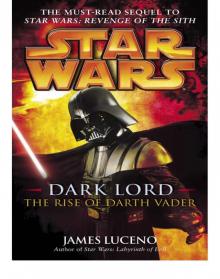 Star Wars: Dark Lord: The Rise of Darth Vader
Star Wars: Dark Lord: The Rise of Darth Vader Star Wars Darth Maul: Saboteur
Star Wars Darth Maul: Saboteur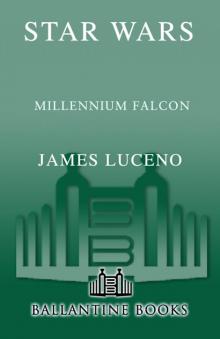 Star Wars: Millennium Falcon
Star Wars: Millennium Falcon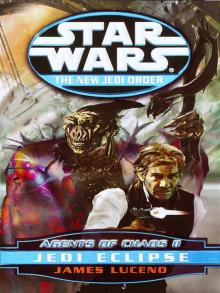 Jedi Eclipse
Jedi Eclipse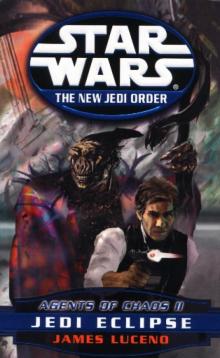 Star Wars The New Jedi Order - Agents of Chaos II - Jedi Eclipse - Book 5
Star Wars The New Jedi Order - Agents of Chaos II - Jedi Eclipse - Book 5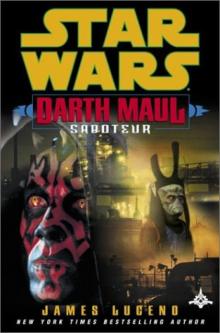 Star Wars - Darth Maul - Saboteur
Star Wars - Darth Maul - Saboteur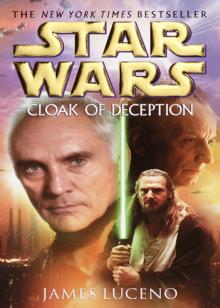 Star Wars: Cloak of Deception
Star Wars: Cloak of Deception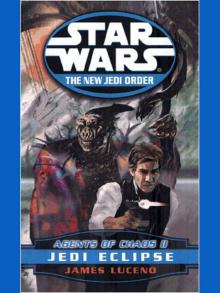 Star Wars: New Jedi Order: Agents of Chaos II: Jedi Eclipse
Star Wars: New Jedi Order: Agents of Chaos II: Jedi Eclipse End Game
End Game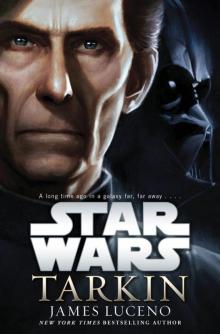 Tarkin: Star Wars
Tarkin: Star Wars Restraint
Restraint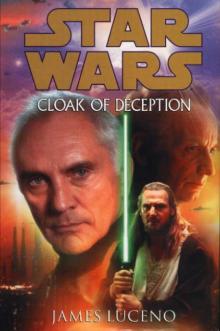 Star Wars - Cloak Of Deception
Star Wars - Cloak Of Deception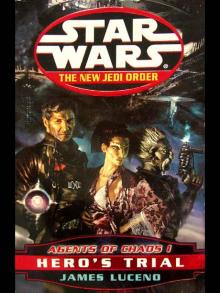 Star Wars: New Jedi Order: Agents of Chaos I: Hero's Trial
Star Wars: New Jedi Order: Agents of Chaos I: Hero's Trial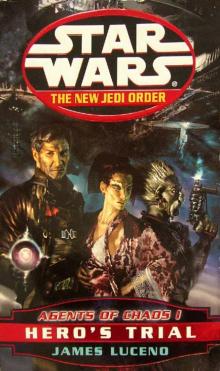 Star Wars The New Jedi Order - Hero's Trial - Book 4
Star Wars The New Jedi Order - Hero's Trial - Book 4 The Essential Novels
The Essential Novels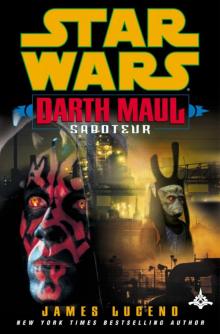 Darth Maul: Saboteur
Darth Maul: Saboteur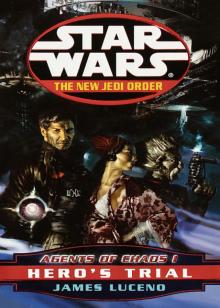 Hero's Trial: Agents of Chaos I
Hero's Trial: Agents of Chaos I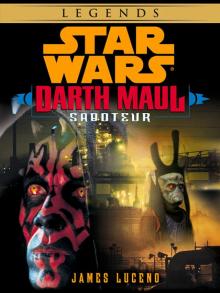 Saboteur
Saboteur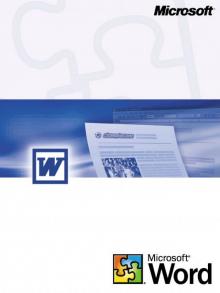 The Unifying Force
The Unifying Force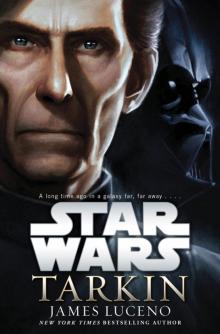 Tarkin
Tarkin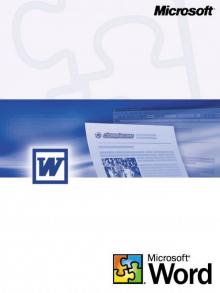 Dark Lord : The Rise of Darth Vader
Dark Lord : The Rise of Darth Vader Catalyst
Catalyst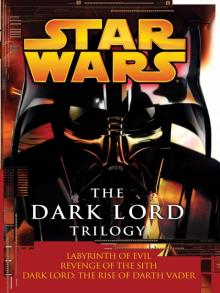 Book 0 - The Dark Lord Trilogy
Book 0 - The Dark Lord Trilogy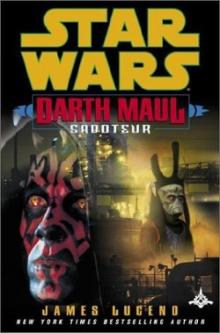 Darth Maul: Saboteur (star wars)
Darth Maul: Saboteur (star wars)